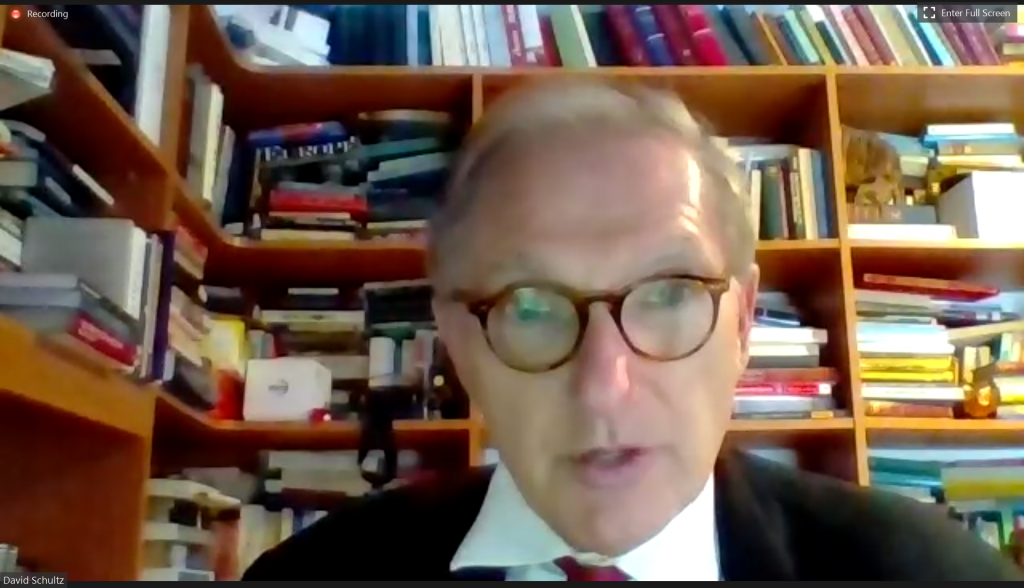Less than two weeks before voters are set to choose between two of the oldest candidates to ever run for president, David Schultz, ‘80, M.A. ‘86, discussed generational politics with Binghamton University students.
On Oct. 21, Schultz spoke about the decline of the baby-boom era and the rise of millennials and Generation Z. Schultz, a professor of political science at Hamline University and professor of law at the University of Minnesota, is a three-time Fulbright scholar. He has authored over 35 books and 200 articles discussing American politics and the role of the media. Schultz is regularly interviewed in the local, national and international media on these topics, including The Wall Street Journal, The Economist, NPR, The New York Times and The Washington Post.
Schultz said he believes it’s important to discuss the issue of generational politics, especially with the general election getting closer.
“This will be the election where political power begins to be handed off to these next two generations, [Millennials and Generation Z], and over the next several years we shall see a redefinition of the American political agenda,” Schultz said. “What we are about to see is a change in what the two parties represent, the issues being debated and perhaps the formation of a new political consensus that over time overcomes the current political polarization.”
Schultz does not normally doesn’t show videos in his classes, but he recalled a time in 2008 when he was teaching overseas and decided to show three clips. Schultz explained he was teaching in Europe and was trying to explain the generational difference between John McCain and Barack Obama.
The first clip that Schultz showed his students was a newsreel from 1938, and it showed British Prime Minister, Neville Chamberlain, landing after coming back from negotiating the Munich Agreement, claiming that there would be “peace for our time.” The second clip was from Pearl Harbor, showing the sinking of the USS Arizona. The final clip was from 1975, and it showed helicopters picking up soldiers from the United States embassy in Vietnam to bring them home.
Schultz spoke on how these clips related to the generational difference between McCain and Obama.
“Everything you need to know about Barack Obama and John McCain is encapsulated in those three video clips,” Schultz said. “For people who came of age at the time that John McCain did, they watched the clips of Neville Chamberlain, they watched the clips of the sinking of the USS Arizona, and the message they walked away with was that the world is a dangerous place. The [United States] won the war, and we can trust the military.”
Schultz described the contrast in how McCain’s generation saw those clips when compared to Obama’s generation.
“But for [Obama,] for baby boomers, for his generation, the video clip of the [United States] embassy, of the helicopters, was about the limits of [United States] military power, that perhaps we can’t knock everybody into submission, maybe we need to think about the world differently,” Schultz said.
He explained how this demonstrated some of the differences between the two generations. Schultz said even in the 1960s most baby boomers were not liberal.
“The polls suggest that a majority of baby boomers didn’t initially support LGBTQ rights or marriage equality,” Schultz said.
Schultz added that even though baby boomers were much more conservative than the media made them out to be, they still have values in common with the younger generations. One of those is regarding the climate, which Schultz believes is one of the most important issues for millennials and Generation Z.
“The baby boomers are interesting,” Schultz said. “Remember, Earth Day is with the baby boomers, and there’s evidence that the baby boomers, at least some, are moved by environmental issues.”
When asked why Schultz was chosen to speak, Laura Bronstein, dean of the College of Community and Public Affairs and director of the Institute for Justice & Well-Being, pointed to his eloquence and knowledge of the subject.
“Professor Schultz is a [BU alumnus] and adjunct professor in CCPA with a vast knowledge of the U.S. political system,” Bronstein said. “He is always exceedingly generous in giving to the University in an array of ways. He is a captivating speaker, so it is a joy to listen and learn from him.”
Bronstein said she hopes the attendees are motivated to vote after hearing Schultz’s talk.
“Given that we are on the brink of an election that has proven to be highly contentious, I am sure [Schultz’s] talk will invigorate anyone who is on the fence about voting to become as knowledgeable as possible about the choices before us and to make their voice heard at the polls,” Bronstein said.



